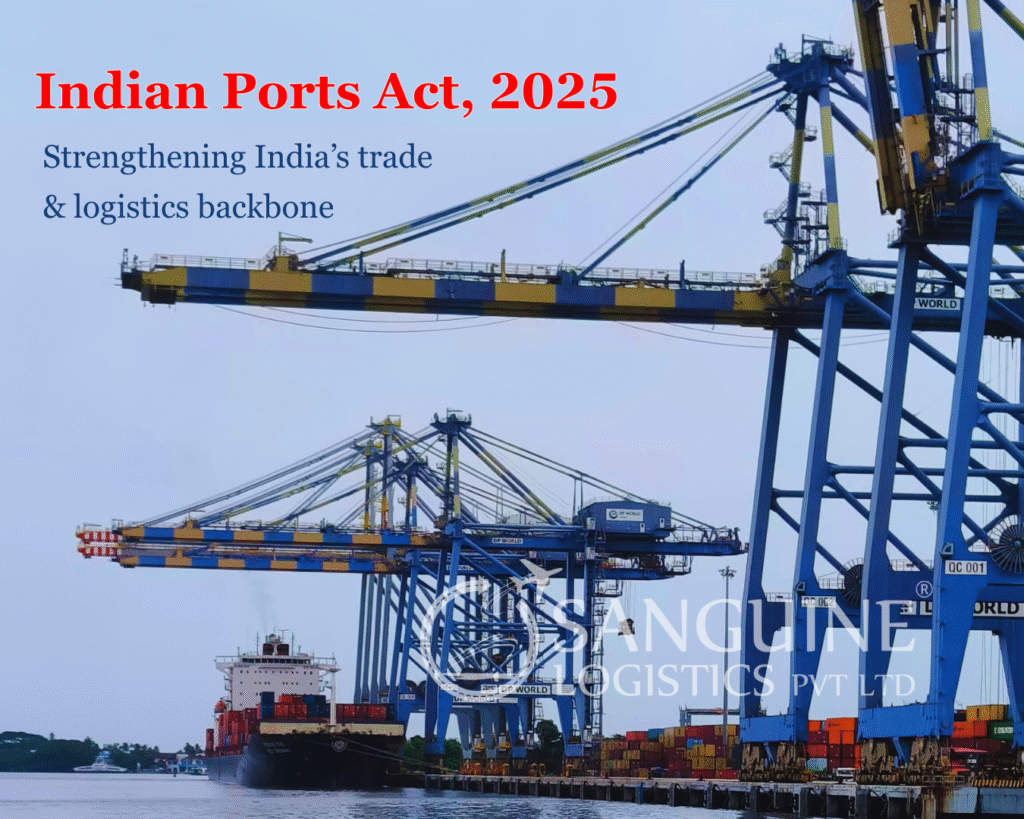
Sanguine Logistics Pvt. Ltd is an ISO 9001:2015 Certified Integrated Logistics Solution Provider & Indian Customs House Licensed Brokerage Company. With AEO Certification confirming our compliant & secure customs clearance processes, we strive to deliver logistics solutions with transparency, efficiency & innovation.
marketing@sanguinelogistics.com
+91 90439 99950

India’s ports are the lifeline of its external trade — over 90% of cargo by volume moves through maritime routes. The recently-passed Indian Ports Act, 2025 marks a watershed reform, replacing the archaic Indian Ports Act of 1908 and introducing a modern legal and institutional framework. For exporters, importers, logistics partners and service providers, this represents a shift towards faster cargo movement, better governance, stronger environmental safeguards and improved international alignment.
Why the reform was needed?
The 1908 Act was drafted in a very different era and did not reflect today’s containerised trade volumes, public-private partnerships, digital systems or environmental obligations. The new Act is part of a broader maritime legislative reform (including the Merchant Shipping Act, 2025 and Carriage of Goods by Sea Act, 2025).
Key institutional changes
- Maritime State Development Council (MSDC): A statutory body to coordinate between the Central Government, coastal States, the Navy, Coast Guard and other stakeholders. It will advise on tariffs, port-data transparency, national port planning and integration.
- State Maritime Boards (SMBs): Empowered to manage non-major ports within States: planning, licensing, regulation, tariffs, safety and environment. This localises governance and promotes faster decision-making.
- Dispute Resolution Committees: Each State will set up these specialised bodies to handle port-related disputes between port users, concessionaires, service providers with quicker resolution.
Digitalisation and operational efficiency
The Act mandates digital systems such as maritime single-windows, online tariff publication, advanced vessel-traffic systems, port data-systems and transparency frameworks. The goal: faster cargo handling, fewer manual bottlenecks, improved ease of doing business.
Environmental, safety and disaster-readiness
Significant enhancements include: compliance with MARPOL & Ballast Water Management Conventions, mandatory waste reception facilities, prevention of pollution, disaster management plans (oil-spills, natural hazards), audits and reporting. These place sustainability and resilience at the heart of port operations.
Tariffs, transparency & “Mega Ports” classification
Tariff-setting frameworks are being streamlined; major and non-major ports will publish charges online to improve predictability. A new classification of “Mega Ports” will channel investments into high-capacity hubs.
Why It Matters
- Predictable governance and clearer rules – less risk, more clarity.
- Faster cargo turnaround, reduced logistics cost – beneficial for exporters/importers.
- Enhanced compliance means exporters and logistic companies need to be ready with environmental, safety and digital systems.
- Sanguine Logistics supports you through this transition: from customs clearance, freight forwarding to compliance with port-related norms and documentation.
The road ahead & how to prepare
While the law is in effect, full implementation will require ports, labs, agencies and users to adapt. Stakeholders should:
- Audit their processes relating to port operations and documentation.
- Leverage digital interfaces and data-systems being rolled out.
- Engage compliance teams to align with new environmental, tariff and governance norms.
- Link with logistics partners who are up to date with the reforms (like Sanguine Logistics) to avoid surprises and delays.
Conclusion
The Indian Ports Act, 2025 is a bold step that positions India’s ports — and by extension its trade ecosystem — for the future. For businesses in export-import, logistics, warehousing and allied sectors, it opens opportunities for efficiency, growth and competitiveness. At Sanguine Logistics, we stand ready to guide you through every element of this transformation.
📞 Let us help you turn these regulatory changes into your logistics advantage. Visit: www.sanguinelogistics.co.in
